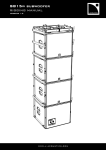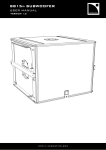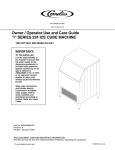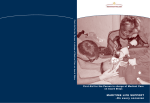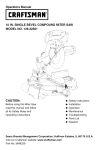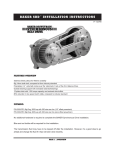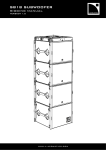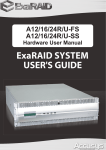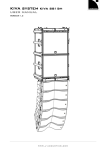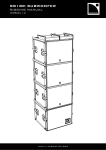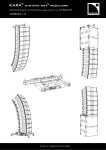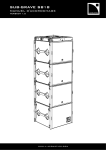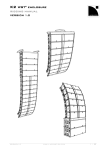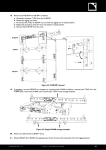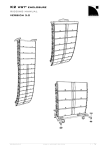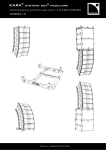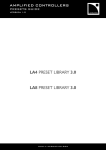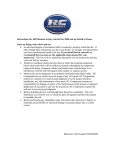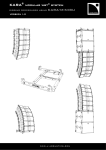Download KIVA SYSTEM KIVA SB15m
Transcript
KIVA SYSTEM KIVA SB15m RIGGING MANUAL VERSION 1.1 www.l-acoustics.com KIVA SYSTEM KIVA SB15m rigging manual VERSION 1.1 SAFETY INSTRUCTIONS 1. Read this manual 2. Follow all SAFETY INSTRUCTIONS as well as DANGER and OBLIGATION warnings 3. Never incorporate equipment or accessories not approved by L-ACOUSTICS® 4. Read all the related PRODUCT INFORMATION documents before exploiting the system The product information document is included in the shipping carton of the related system component. 5. Work with qualified personnel for rigging the system Installation should only be carried out by qualified personnel that are familiar with the rigging techniques and safety recommendations outlined in this manual. 6. Ensure personnel health and safety During installation and set-up personnel must wear protective headgear and footwear at all times. Under no circumstances personnel is allowed to climb on a loudspeaker assembly. 7. Respect the Working Load Limit (WLL) of third party equipment L-ACOUSTICS® is not responsible for any rigging equipment and accessories provided by third party manufacturers. Verify that the Working Load Limit (WLL) of the suspension points, chain hoists and all additional hardware rigging accessories is respected. 8. Respect the maximum configurations and the recommended safety level For safety issue, respect the maximum configurations outlined in this manual. To check the conformity of any configuration in regards with the safety level recommended by L-ACOUSTICS®, model the system in SOUNDVISION and refer to the warnings in Mechanical Data section. 9. Be cautious when flying a loudspeaker array Always verify that no one is standing underneath the loudspeaker array when it is being raised. As the array is being raised, check each individual element to make sure that it is securely fastened to the adjacent element. Never leave the array unattended during the installation process. As a general rule, L-ACOUSTICS® recommends the use of safety slings at all times. 10. Be cautious when ground-stacking a loudspeaker array Do not stack the loudspeaker array on unstable ground or surface. If the array is stacked on a structure, platform, or stage, always check that the latter can support the total weight of the array. As a general rule, L-ACOUSTICS® recommends the use of safety straps at all times. 11. Take into account the wind effects on dynamic load When a loudspeaker assembly is deployed in an open air environment, wind can produce dynamic stress to the rigging components and suspension points. If the wind force exceeds 6 bft (Beaufort scale), lower down and/or secure the loudspeaker array. SYMBOLS The following symbols are used in this document: DANGER This symbol indicates a potential risk of harm to an individual or damage to the product. It can also notify the user about instructions that must be strictly followed to ensure safe installation or operation of the product. OBLIGATION This symbol notifies the user about instructions that must be strictly followed to ensure proper installation or operation of the product. EQUIPMENT This symbol indicates the equipment, tools, and spare parts required to perform a procedure. INFORMATION This symbol notifies the user about complementary information or optional instructions. KIVA-SB15 m _RM_EN_1.1 www.l-acoustics.com 2 WELCOME TO L-ACOUSTICS® Thank you for choosing the L-ACOUSTICS® KIVA enclosure. This document contains essential information on rigging the system properly. Carefully read this document in order to become familiar with this procudures. As part of a continuous evolution of techniques and standards, L-ACOUSTICS® reserves the right to change the specifications of its products and the content of its documents without prior notice. Please check the L-ACOUSTICS® web site on a regular basis to download the latest documents: www.l-acoustics.com. If the product requires repair or for information about the warranty, please contact an approved L-ACOUSTICS® distributor. The address of the nearest distributor is available on the L-ACOUSTICS® web site. CONTENTS 1 1.1 1.2 1.3 RIGGING SYSTEM COMPONENTS 4 Loudspeaker enclosures .......................................................................................................................................... 4 Rigging elements ...................................................................................................................................................... 4 Software application ................................................................................................................................................ 4 2 2.1 2.2 MECHANICAL SAFETY 6 Maximum configurations ......................................................................................................................................... 6 Assessing mechanical safety ..................................................................................................................................... 6 3 3.1 3.2 3.3 SYSTEM SETUP 7 Ground-stacking ...................................................................................................................................................... 8 Flying........................................................................................................................................................................ 9 Pole-mounting ....................................................................................................................................................... 10 4 SUBSET PROCEDURES 11 PROCEDURE A Attaching the SB15m to a second element .................................................................................... 11 PROCEDURE B Attaching KIVA to a another element ............................................................................................ 12 PROCEDURE C Attaching a shackle or CLAMP250................................................................................................. 15 Attaching KIET to KIVA ................................................................................................................. 16 PROCEDURE D APPENDIX A INSTALLING THE LAP-TEQ INCLINOMETER 18 APPENDIX B SPECIFICATIONS 19 KIVA ............................................................................................................................................................................... 19 SB15m .............................................................................................................................................................................. 20 KIVA-SB15 m _RM_EN_1.1 www.l-acoustics.com 3 KIVA SYSTEM KIVA SB15m rigging manual VERSION 1.1 1 RIGGING SYSTEM COMPONENTS The system approach developed by L-ACOUSTICS® consists in providing packaged solutions for loudspeaker system in order to guarantee the highest and most predictable level of performance at any step: modeling, installation, and operation. An L-ACOUSTICS® loudspeaker system is the set of components available to form any loudspeaker system based on one of the full-range loudspeaker enclosure afforded by L-ACOUSTICS®. It includes enclosures, rigging accessories, loudspeaker cables, amplified controllers, and software applications. The rigging components of the KIVA system are the following: 1.1 Loudspeaker enclosures KIVA Main enclosure, deployable in a variable curvature line source. SB15m Subwoofer enclosure. Provided with two SB15MRIG coupling bars, equipped with the LOCKTAB locking tab. 1.2 Rigging elements KIBU-SB Frame for flying KIVA and SB15m enclosures as line elements or independent/mixed arrays. Provided with two bow shackles WLL 1 t. KIET Accessory used to fly one or two KIVA enclosures in an under-balcony configuration or to mount one or two enclosures on a pole (on a speaker stand or above a SB15m subwoofer). Provided with a pole adapter, four M8 hex bolts and four M8 self-locking nuts. CLAMP250 Truss clamp. SB15MRIG Coupling bars dedicated to the SB15m. Equipped with the LOCKTAB locking tab. Delivered with the SB15m. 1.3 Software application SOUNDVISION Proprietary 3D acoustical and mechanical modeling software Mechanical safety Before any installation, model the system in SOUNDVISION and check the Mechanical Data section for any stress warnings. Other KIVA system components All the other components of the system are presented in the KIVA system user manual, document in which the loudspeaker configurations and connection are described. KIVA-SB15 m _RM_EN_1.1 www.l-acoustics.com 4 KIVA SB15m KIBU-SB CLAMP250 SB15MRIG equipped with LOCKTAB (Delivered with the SB15m) KIET SOUNDVISION Main components involved in the KIVA rigging process. KIVA-SB15 m _RM_EN_1.1 www.l-acoustics.com 5 KIVA SYSTEM KIVA SB15m rigging manual VERSION 1.1 2 MECHANICAL SAFETY 2.1 Maximum configurations The KIVA system rigging complies with BGV-C1 (2012), DIN 18800 and EN ISO 12100-1 (2004) when the following arrays are deployed. The safe configurations are always compliant with the standards listed before, regardless of the deployment parameters (site angles, inter-enclosure angles, etc.). The maximum configurations correspond to the mechanical limit of the rigging accessories, before deploying these configurations always model the system in SOUNDVISION and check the Mechanical Data section for any stress warning or stability warning. For mixed arrays always refer to your SOUNDVISION model. With KIBU-SB With KIBU-SB and shackle WLL 1 t With KIBU-SB and CLAMP250 Safe Flying 2 KIVA or 8 SB15m 12 KIVA or 8 SB15m 12 KIVA or 6 SB15m Maximum Stacking 20 KIVA or 8 SB15m 20 KIVA or 8 SB15m 18 KIVA or 6 SB15m Mechanical safety of the rigging system Before any installation, always model the system in SOUNDVISION and check the Mechanical Data section for any stress warning or stability warning. 2.2 Assessing mechanical safety In order to assess the actual safety of any array configuration before implementation, refer to the following warnings: Rated working load limit (WLL) is not enough The rated WLL is an indication of the element resistance to tensile stress. For complex mechanical systems such as loudspeaker arrays, WLLs cannot be used per se to determine the maximum number of enclosures within an array or to assess the safety of a specific array configuration. Mechanical modeling with SOUNDVISION The working load applied to each linking point, along with the corresponding safety factor, will depend on numerous variables linked to the composition of the array (type and number of enclosures, splay angles) and the implementation of the flying or stacking structure (number and location of flying points, site angle). This cannot be determined without the complex mechanical modeling and calculation offered by SOUNDVISON. Assessing the safety with SOUNDVISION The overall safety factor of a specific mechanical configuration always corresponds to the lowest safety factor among all the linking points. Always model the system configuration with the SOUNDVISION software and check the Mechanical Data section to identify the weakest link and its corresponding working load. By default, a stress warning will appear when the mechanical safety goes beyond the recommended safety level. Safety of ground-stacked arrays in SOUNDVISION For ground-stacked arrays, a distinct stability warning is implemented in SOUNDVISION. It indicates a tipping hazard when the array is not secured to the ground, stage or platform. It is user responsibility to achieve full anchorage and to ignore this warning. Consideration must be given to unusual conditions SOUNDVISION calculations are based upon usual environmental conditions. A higher safety factor is recommended with factors such as extreme high or low temperatures, strong wind, prolonged exposition to salt water, etc. Always consult a rigging specialist to adopt safety practices adapted to such a situation. KIVA-SB15 m _RM_EN_1.1 www.l-acoustics.com 6 3 SYSTEM SETUP The KIVA-SB15m rigging system relies on the use of KIBU-SB as an interface between the two enclosures rigging systems. Each side of KIBU-SB is compatible with one enclosure type: KIVA side SB15m side KIVA-SB15 m _RM_EN_1.1 www.l-acoustics.com 7 KIVA SYSTEM KIVA SB15m rigging manual VERSION 1.1 3.1 Ground-stacking KIVA Remove the rigging bars from a KIBU-SB. Place the KIBU-SB on the ground with its KIVA side facing up. Attach a KIVA (logo on the left-hand side) to the KIBU-SB. Refer to PROCEDURE B. Attach another KIVA on top. Refer to PROCEDURE B. Repeat the previous step until the array is completed. Risk of fall Do not climb on a loudspeaker array. KIVA + SB15m Place one SB15m (logo down) on the ground. If necessary, place and attach additional subwoofers (logo down) on top of each other. Refer to PROCEDURE A. On the subwoofer array, place and attach a KIBU-SB with its KIVA side facing up. Refer to PROCEDURE A. Attach a KIVA (logo on the left-hand side) to the KIBU-SB. Refer to PROCEDURE B. Attach as many KIVA enclosures as necessary on top. Refer to PROCEDURE B. KIVA-SB15 m _RM_EN_1.1 www.l-acoustics.com 8 3.2 Flying KIVA Place a KIBU-SB on the ground with its KIVA side facing up. Attach a KIVA enclosure to the KIBU-SB. Refer to PROCEDURE B. Turn the KIVA/KIBU-SB assembly upside down. Attach a bow shackle WLL 1 t or a CLAMP250 on the KIBU-SB. Refer to PROCEDURE B. Raise the array so you are comfortable lifting and attaching additional enclosures under the first one. Attach a KIVA enclosure under the first one. Refer to PROCEDURE B. Repeat the two previous steps until the array is complete. Always check that the yellow label on the locking tabs is fully covered to ensure that they are fully engaged. KIVA + SB15m Position one SB15m (logo down) on the ground. Remove the rigging bars from the KIBU-SB. On the subwoofer, place and attach a KIBU-SB with its KIVA side facing up. Refer to PROCEDURE A. Attach a bow shackle WLL 1 t or a CLAMP250 on the KIBU-SB. Refer to PROCEDURE B. If more than one SB15m is needed, raise the array so you can position another SB15m under it. Lower the array so it rests on the enclosure. Attach the enclosure to the bottom of the array. Refer to PROCEDURE A. Repeat the three previous steps until the SB15m array is completed. Place a KIBU-SB on the ground with its KIVA side facing up. Attach a KIVA enclosure to the KIBU-SB. Refer to PROCEDURE B. Turn the KIVA/KIBU-SB assembly upside down. Raise the SB15m array so you are comfortable lifting and attaching the KIVA/KIBU-SB assembly under the bottom enclosure. With the rigging bar in one hand, lift and attach the KIVA/KIBU-SB assembly to the bottom enclosure of the array. Refer to PROCEDURE A. Raise the array so you are comfortable lifting and attaching additional enclosures under the first one. Attach a KIVA enclosure under the array. Refer to PROCEDURE B. Repeat the two previous steps until the array is completed. KIVA-SB15 m _RM_EN_1.1 www.l-acoustics.com 9 KIVA SYSTEM KIVA SB15m rigging manual VERSION 1.1 3.3 Pole-mounting KIVA + SB15m Place a SB15m (logo down) on the ground. If two KIVA are required, place one enclosure on the ground (logo on the left-hand side) and attach a second enclosure to it. Refer to PROCEDURE B. Assemble the KIET and the pole adapter and attach the assembly on the KIVA enclosure(s). Refer to PROCEDURE D. Insert and secure the pole in the SB15m socket. Secure the KIET and KIVA assembly on the pole. Dismantling the system Identify the array to dismount and apply the associated set-up procedure in reversed order. KIVA-SB15 m _RM_EN_1.1 www.l-acoustics.com 10 4 SUBSET PROCEDURES PROCEDURE A 1. 2. 3. Attaching the SB15m to a second element Remove the bar from its storage location. From the front of the array, slide the bar into adjacent rigging rails. Secure the bar with the locking tab. a. b. c. Accurately position the bar by pushing it into place. Pinch the spring tongue and slide the locking tab until it snaps into place. When encountering difficulty, try to slide the tab from the other side. Verify that the yellow label is fully covered to ensure of the locking tab is engaged. PROCEDURE A Sliding the coupling bar between two SB15m. 2. Sliding the coupling bar between SB15m and KIBU-SB. Always check that the yellow label is fully covered to ensure the locking tabs are fully engaged. 3. KIVA-SB15 m _RM_EN_1.1 Securing the bar with the locking tab. www.l-acoustics.com 11 KIVA SYSTEM KIVA SB15m rigging manual VERSION 1.1 PROCEDURE B Attaching KIVA to a another element The rigging procedure used to attach a KIVA enclosure to another KIVA enclosure and to KIBU-SB is similar. The main difference lies in: the possibility to choose front or rear position of the enclosure on the bumper (see next page), the way the angle is defined between two enclosures and between KIBU-SB and the enclosure. In a flown array, the rear position enables reaching a higher positive angle and the front position a higher negative angle. The site angle of a stacked KIVA array is defined by the angle between the KIBU-SB and the enclosure closest to the bumper. The range of available angles varies depending of the rigging position: front position: 0°, -1°, -2°. rear position: +7.5°, +5°, +2.5°, 0°, -2.5°, -3.5°, -4.5°, -5.5°, -6.5°, -7.5°. Refer to Figure 1 to choose the hole corresponding to the targeted site angle. Figure 1 Angulation arm holes Resulting angles in front position Resulting angles in rear position 0° site angle for flown arrays When flying a KIVA array, either as part of a mixed or independent line, always use the 0° rigging hole. If any other angle is defined between the bumper and the first enclosure, the LAPTEQ inclinometer (see APPENDIX A) no longer provides a valid indication regarding the array site angle. Ground-stacked KIVA with a positive 7.5° site angle When KIVA is ground-stacked with a positive 7.5° site angle, it is not possible to secure the rigging arm on the bumper. Leave the arm in its slot. However, when KIVA is stacked on SB15m, it is possible to secure the rigging arm on the bumper for all the angles. KIVA-SB15 m _RM_EN_1.1 www.l-acoustics.com 12 1. If you are attaching a KIVA enclosure to a KIBU-SB, refer to the SOUNDVISION modeling to identify the position (rear, front) that corresponds to the targeted site angle. 2. Attach the two linking points at the front of the enclosure to the two linking points of the other element (enclosure or KIBU-SB). a. b. c. Put the enclosure side in contact with the second element. Align the enclosure linking points slightly left to the linking points of the other element. Slide the enclosure to the right until you hear a clicking sound to secure and lock the system. Risk of fall After attaching an enclosure, verify the automatic locking system is engaged: hold the bottom of the enclosure and shake it side to side. 3. Secure the angulation arm of the enclosure on the second element using the appropriate hole for your configuration. a. On the enclosure, pull the spring-loaded pin to release the angulation arm. b. If you are attaching two enclosures together: i. Pull the second enclosure spring-loaded pin. ii. Rotate the arm in the second enclosure slot. iii. Select the targeted angle by aligning the top of the arm with the corresponding notation on the second enclosure. iv. Release the spring-loaded pin to its initial position to lock the assembly. If you are attaching an enclosure to the KIBU-SB: i. Remove the ball locking pin from the KIBU-SB. ii. Position the angulation arm to position it between the two walls of the KIBU-SB central bar. iii. Select the targeted angle by choosing the appropriate hole on the angulation arm. Refer to Figure 1 Angulation arm holes on page 12. iv. Insert the pin through the holes in KIBU-SB central bar and the enclosure angulation arm. PROCEDURE B Front position. 1. Attaching KIVA to a second KIVA. 2. KIVA-SB15 m _RM_EN_1.1 Rear position. Attaching KIVA to KIBU-SB. www.l-acoustics.com 13 KIVA SYSTEM KIVA SB15m rigging manual VERSION 1.1 3.a. Attaching the angulation arm of a KIVA to KIVA. KIVA-SB15 m _RM_EN_1.1 Releasing the angulation arm. 3.b. Attaching the angulation arm of a KIVA to KIBU-SB. www.l-acoustics.com 14 PROCEDURE C 1. Attaching a shackle or CLAMP250 Refer to SOUNDVISION modeling to identify the hole number that corresponds to the targeted tilt angle. KIBU-SB hole numbering on the side of the SB15m KIBU-SB hole numbering on the side of the KIVA 2. Attach a shackle or a CLAMP250 to the identified hole, by driving the pierced bolt. 3. Secure the pierced bolt with the safety pin. 4. With a CLAMP250, install safety slings between the KIBU-SB and the truss. PROCEDURE C A shackle being attached on the KIBU-SB. 2.b. KIVA-SB15 m _RM_EN_1.1 2.a. A CLAMP250 being attached on the KIBU-SB. Safety pin mechanism on shackles. www.l-acoustics.com 15 KIVA SYSTEM KIVA SB15m rigging manual VERSION 1.1 PROCEDURE D Attaching KIET to KIVA The site angle of a pole-mounted KIVA enclosure is defined by its angle with the KIET. Refer to Figure 2 to choose the hole corresponding to the targeted site angle. Figure 2 Angulation arm holes EQUIPMENT Electric screwdriver with torque selector. 13 mm hex socket. 13 mm hex key. 1. Assemble the KIET and the pole adapter with the four M8 hex bolts and nuts provided in the package.. Use a 13 mm hex key, a 13 mm hex socket and set the torque to 5 N.m/45 in.lb 2. Attach the two linking points at the front of the KIET to the two linking points of the enclosure. a. b. c. 3. 4. Place the KIVA enclosure with its logo on the right on a stable horizontal surface. Align the KIET linking points slightly left to the linking points of the enclosure. Slide the KIET to the right until you hear a clicking sound to secure and lock the system. Secure the enclosure angulation arm on the KIET using the hole corresponding to the targeted site angle. a. Remove the ball-locking pin from the KIET. b. c. d. Pull the spring-loaded pin to release the angulation arm from the enclosure. Position the arm in the KIET slot. Insert the pin through the KIET slot and the hole corresponding to the targeted angle. Refer to Figure 2 Angulation arm holes. Verify the locking system is engaged by shaking the assembly up and down and side to side. KIVA-SB15 m _RM_EN_1.1 www.l-acoustics.com 16 PROCEDURE D 1. Assembling the KIET and its pole adapter. 2. Attaching the KIET and the enclosure. 3. KIVA-SB15 m _RM_EN_1.1 Securing the enclosure angulation arm on the KIET. www.l-acoustics.com 17 KIVA SYSTEM KIVA SB15m rigging manual VERSION 1.1 APPENDIX A INSTALLING THE LAP-TEQ INCLINOMETER The KIBU-SB is equipped with a laser support plate for the installation of the TEQSAS® LAP-TEQ inclinometer. The LAP-TEQ is a remote control device which is part of the L-ACOUSTICS® TECH TOOLCASE. Equipment Electric screwdriver with torque selector. T20 Torx® bit. 7 mm hex key. 1. Put the KIBU-SB with its SB15m side up. 2. Undo the four Torx® bolts on the laser support plate. Use a T20 bit and a 7 mm hex key. 3. Place the LAP-TEQ on the support plate with its laser lens towards the front laser slit. Verify nothing obstructs the opening. 4. Secure the LAP-TEQ with the four Torx® bolts and nuts. Use a T20 bit, a 7 mm hex key and set the torque at 3 N.m / 27 in.lbf. Calibrating the LAP-TEQ Refer to the manufacturer instructions in the L-ACOUSTICS® TECH TOOLCASE. In addition to the handheld inclinometer available in the TOOLCASE. An XLR3 cable is needed. KIVA-SB15 m _RM_EN_1.1 www.l-acoustics.com 18 APPENDIX B SPECIFICATIONS KIVA Description 2-way passive enclosure, amplified by LA4 or LA8 Usable bandwidth (-10 dB) 80 Hz - 20 kHz ([KIVA] preset) Maximum SPL1 130 dB ([KIVA] preset) Coverage angle (-6 dB) Horizontal: 100° (from 500 Hz) Vertical: depends on the number of elements and array curvature LF: 2 6.5", weather-resistant, bass-reflex Transducers HF: 1 1.5", diaphragm compression driver, DOSC® waveguide Nominal impedance 8Ω RMS power handling 120 W Connectors IN: 1 4-point SpeakON® LINK: 1 4-point SpeakON® Captive 3-point rigging system Inter-enclosure angles: 0, 1, 2, 3, 4, 5, 7.5, 10, 12.5 or 15° Rigging components Dimensions Physical data Weight (net): 13 kg / 28.7 lb Cabinet: Back plate: Composite sandwich structure ZAMAC Grey brown, RAL 8019® or Pure white RAL 9010® Custom RAL code on special order Plastic grill Airnet® acoustically neutral fabric High strength steel with anti-corrosion coating Finish: Front: Rigging components: 1 Peak level at 1 m under free field conditions using 10 dB crest factor pink noise with specified preset. KIVA-SB15 m _RM_EN_1.1 www.l-acoustics.com 19 KIVA SYSTEM KIVA SB15m rigging manual VERSION 1.1 SB15m Description Subwoofer enclosure, amplified by LA4 or LA8 Low frequency limit (‑10 dB) Maximum SPL 1 40 Hz ([SB15_100] preset) 135 dB ([SB15_100] preset) RMS power handling 600 W Transducer 1 15" weather-resistant, bass-reflex Nominal impedance 8Ω Connectors IN: 1 4-point SpeakON® LINK: 1 4-point SpeakON® Integrated pole-mount socket Coupling bars stored at handle position Rigging components Dimensions Physical data 1 Weight (net): 36 kg / 79.4 lb Cabinet: Baltic birch plywood Finish: Protection Rating: Grey brown RAL 8019® or Pure white RAL 9010® Custom RAL code on order Steel grill with anti-corrosion coating Airnet® acoustically neutral fabric IP45 Rigging component: High strength steel with anti-corrosion coating Front: Peak level at 1 m under half-space conditions using 10 dB crest factor pink noise with specified preset. KIVA-SB15 m _RM_EN_1.1 www.l-acoustics.com 20




















